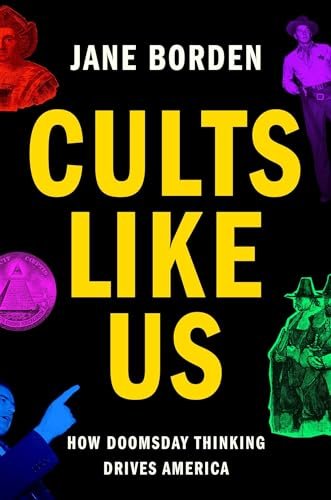
Book Review of Cults Like Us: Why Doomsday Thinking Drives America
Exploring the Depths of Doomsday Thinking in Cults Like Us
When I stumbled upon Jane Borden’s Cults Like Us: Why Doomsday Thinking Drives America, I was instantly captivated. As a long-time observer of how cults entrap individuals, I often grapple with the bewildering allure they seem to exert. My fascination lies in the paradox of surrendering one’s identity to a group—a behavior I perceive as distinctly un-American. This book promised to unravel that anomaly, and I am grateful to Atria/One Signal Publishers and NetGalley for providing me with an advanced copy.
What I found was a thought-provoking exploration that diverged from my expectations in the best of ways. Rather than a mere catalog of infamous cults, Borden’s work delves into the ideological undercurrents that link the concept of cults with broader American thought. Drawing parallels across history—from Columbus’s colonization efforts to contemporary political movements—she convincingly argues that the roots of doomsday thinking extend deep into the fabric of American society.
One of the key themes is apocalyptic thinking, which Borden recontextualizes beyond the traditional notion of "end times." Instead, she examines it as the pursuit of "truth" or a moment of revelation. This reinterpretation was enlightening, challenging me to see figures like Columbus and the Puritans in a starkly different light—less as heroic pioneers and more as harbingers of a fear-driven mindset that persists today. The unsettling awareness that our political landscape is not so different now was both eye-opening and troubling.
Borden’s writing style adeptly balances serious inquiry with moments of dry humor, making the exploration easier to digest. Her narrative pace keeps you engaged, moving fluidly from historical analysis to contemporary implications. I particularly appreciated her critiques on how modern leaders exploit fear using cult-like tactics, making reference to figures like Donald Trump without demonizing them, but rather contextualizing their behaviors within a larger pattern of American culture.
Memorable quotes dotted throughout the text resonate deeply, such as her observation that "fear is the mind killer"—a statement that seems all too pertinent in today’s heightened climate of anxiety and division. Borden brilliantly highlights this alongside lesser-known cults and movements, bringing a fresh perspective that encourages readers to question the motives behind popular ideologies and movements around them.
In the conclusion, Borden emphasizes that cult dynamics are not just historical curiosities; they are stitched into the identity of American culture. This perspective made me reflect on our collective yearning for community and certainty in an increasingly fragmented world.
Cults Like Us is not merely an exposé on cults; it’s a vital exploration of how fear, identity, and community intersect and shape our lives. I highly recommend it to anyone fascinated by psychology, sociology, or politics. Whether you’re a casual reader curious about the intricacies of belief systems or a more seasoned thinker looking for a rigorous yet accessible analysis, Borden’s work will undoubtedly provoke contemplation about our present and our past.
As I closed the book, I felt a blend of challenge and clarity, realizing this might be a text I return to for deeper reflection. In a tumultuous political atmosphere, Borden provides an important lens through which to examine our own beliefs and behaviors, urging us all to be vigilant about where we place our trust.
Discover more about Cults Like Us: Why Doomsday Thinking Drives America on GoodReads >>


